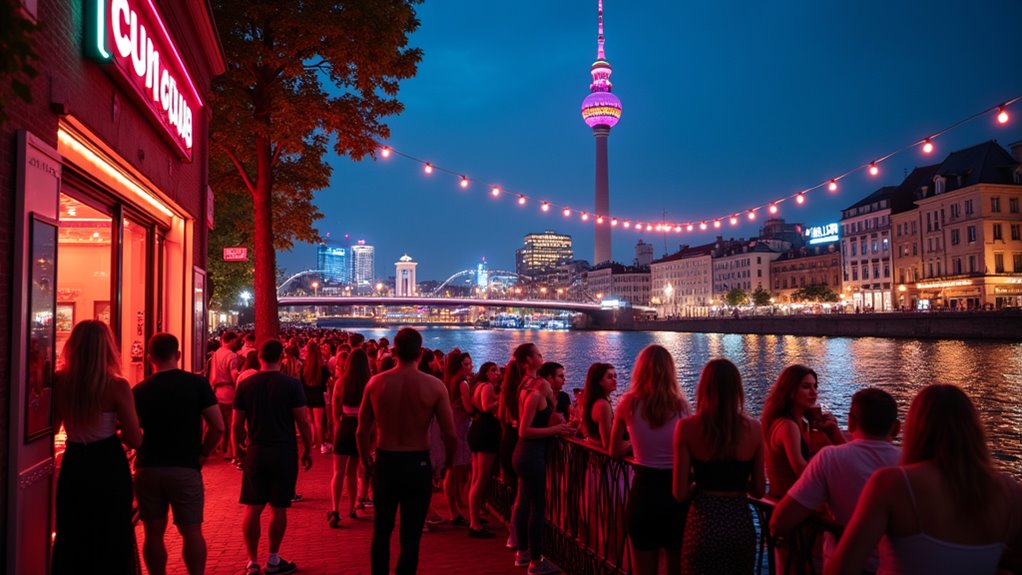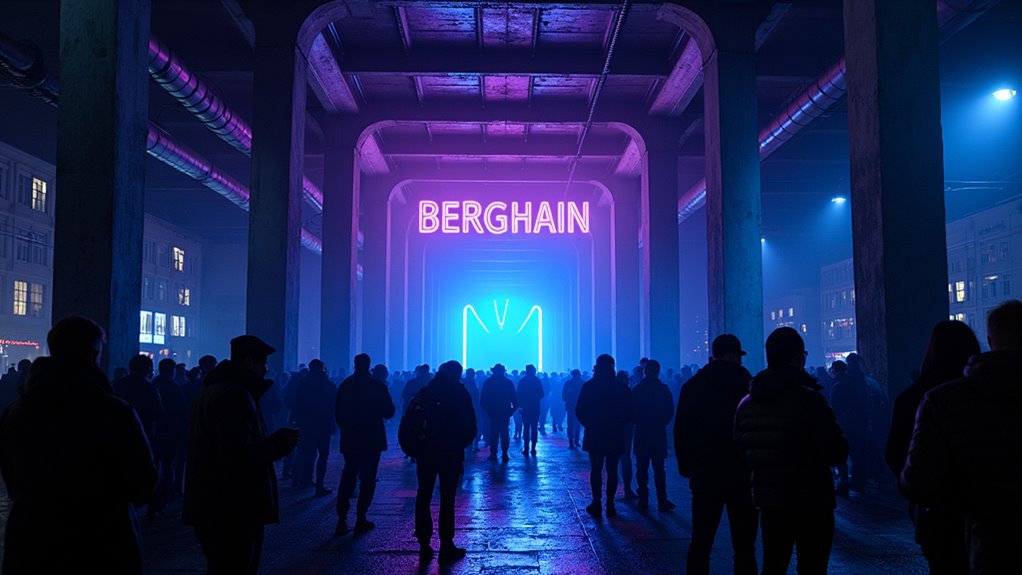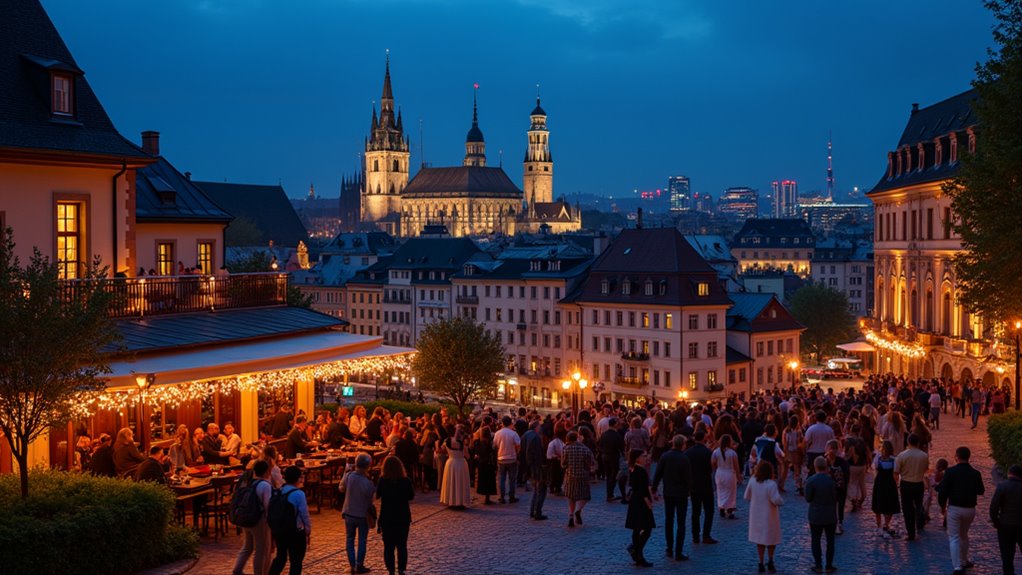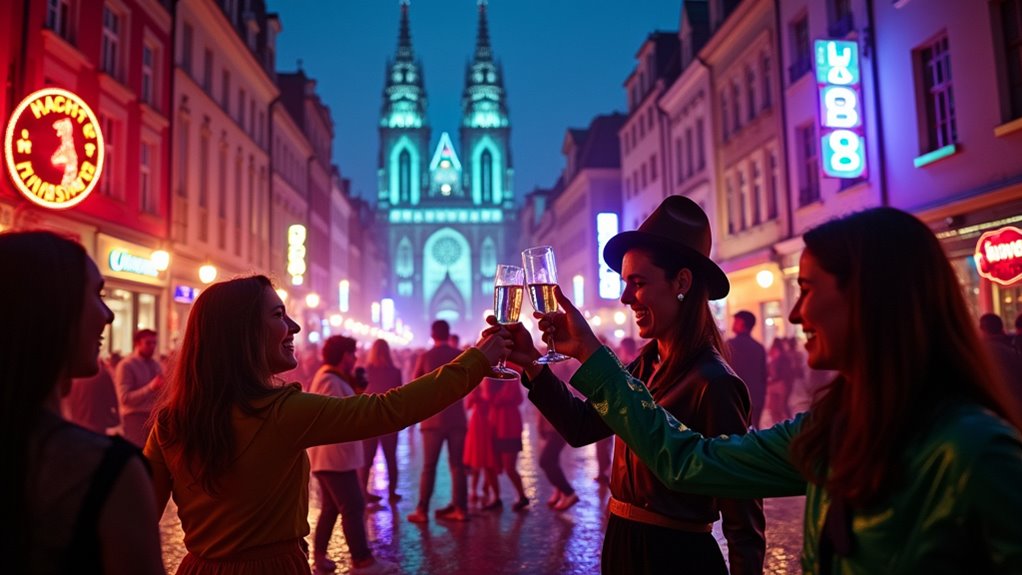Physical Address
304 North Cardinal St.
Dorchester Center, MA 02124
Physical Address
304 North Cardinal St.
Dorchester Center, MA 02124

In Berlin, Hamburg, and beyond, Germany's top party destinations transform after dark, but which city truly offers the ultimate nightlife experience?
Germany’s top party destinations offer distinct nightlife experiences: Berlin leads with pioneering underground techno, Hamburg boasts the lively Reeperbahn strip, Munich blends Bavarian tradition with upscale venues, Frankfurt combines financial elegance with vibrant clubs, Cologne maintains its carnival spirit year-round, and Bonn features hidden gems among cultural attractions. You’ll find everything from 24-hour industrial raves to sophisticated cocktail lounges as you explore these diverse German cities and their unique after-dark personalities.

When the Berlin Wall fell in 1989, it didn’t just unite a divided city—it unleashed an unprecedented explosion of underground club culture that would transform the global electronic music landscape.
Abandoned factories and bunkers became techno temples like Tresor, which established Berlin’s reputation by hosting Detroit pioneers.
From concrete ruins rose bass-driven utopias, where Detroit’s electronic prophets found freedom on German dance floors
Today, you’ll find iconic venues like Berghain with its legendary door policy and 24+ hour parties, Watergate’s riverside dance floors, and KitKatClub’s avant-garde experimentation.
The city’s €1.48 billion club tourism industry thrives on 24-hour licensing that enables nonstop celebrations.
Despite gentrification pressures, Berlin’s DIY ethos endures.
The lack of curfew in Berlin has contributed significantly to its vibrant nightlife scene, allowing clubs to operate round-the-clock.
While Berlin dominates the nightlife scene, those seeking a different Mediterranean vibe might consider the contrast between Greek islands and Malta for daytime relaxation before the night’s festivities.
The techno-dominated scene continues evolving through minimal and experimental subgenres while maintaining the raw, anarchic spirit born in those post-reunification days.
Nestled in Hamburg’s St. Pauli district, the legendary 930-meter Reeperbahn strip offers a nightlife experience unlike any other in Germany. You’ll find over 50 venues spanning from the vibrant Spielbudenplatz to music-centric Große Freiheit and bustling Hans-Albers-Platz.
What began as a humble rope-making street has evolved into Germany’s premier entertainment district. Locals affectionately refer to this area as the Kiez, stretching from Millerntorstadion to Nobistor. You can explore the Panoptikum (Germany’s oldest wax museum), catch performances at the Operetta House, or dance until dawn at genre-spanning venues like Mojo Club and Docks.
Don’t miss the Beatles monuments commemorating their 1960s residency, or the annual Reeperbahn Festival featuring 900+ artists across 80 venues. With U-Bahn stations providing easy access and venues operating until sunrise, Hamburg’s nightlife was recently ranked best globally by Hostelworld. The vibrant atmosphere rivals even Zagreb’s nightlife, which has become increasingly popular among European travelers.

Munich bridges its deep-rooted Bavarian heritage with a sophisticated, evolving nightlife scene that appeals to both traditional enthusiasts and contemporary party-seekers.
You’ll find legendary venues like Blitz, Palais, and Pimpernel pumping electro, house, and techno until 8 AM, with headliners typically taking the stage around 2 AM.
For LGBTQ+ entertainment, head to NY.Club (formerly New York New York), Munich’s premier queer venue hosting award-winning “Luxuspop” nights and inclusive events.
Beyond clubs, the city’s cocktail bars are redefining Munich’s drink culture with Bavarian-inspired mixology.
While clubs operate primarily Friday-Saturday, bars serve until 1-3 AM most nights.
For visitors with families looking to experience the cultural side of Munich before nightfall, the city ranks among Germany’s best locations for family-friendly daytime activities.
The Schlachthof district has become Munich’s unofficial party zone, featuring vibrant venues like Bahnwärter Thiel and Alte Utting terrace for those seeking an alternative nightlife experience.
Arrive before midnight to avoid lines, though the real energy builds well after that hour as the sophisticated and alternative crowds merge.
Known as Germany’s financial powerhouse, Frankfurt transforms after business hours into a sophisticated playground where banking professionals and international visitors converge. The city’s nightlife scene perfectly balances corporate elegance with pulsating energy.
Frankfurt’s dual identity merges daytime financial prowess with evening sophistication, creating an electrifying nightlife experience unlike any other German city.
When exploring Frankfurt’s nightlife, you’ll find:
While Frankfurt’s venue numbers don’t match Cologne and Berlin, the city still offers quality nightlife experiences for visitors and locals alike.
The €5.4 billion nightlife industry guarantees you’ll experience top-tier service whether you’re seeking late-night dancing or post-work cocktails.
Travelers should note that while Frankfurt offers excellent nightlife, prices tend to be higher than some other German cities but still more affordable than Stockholm’s nightlife costs.

Cologne vibrates with an infectious party spirit that transcends its world-famous Carnival season, making it Germany’s undisputed celebration capital. The festivities officially kick off each November 11th at 11:11 AM, culminating in the spectacular Rose Monday Parade that draws 1.5 million spectators.
You’ll find over 800 pubs dotting the Old Town, while the Belgian Quarter and Ehrenfeld district offer trendy bars and techno clubs. Don’t miss summer beach bars along the Rhine or cocktail lounges at Rheinauhafen docks.
During Carnival, shout “Kölle Alaaf!” as you witness the Dreigestirn trio lead celebrations that generate €500 million annually. The trio, established as an entity since 1883, consists of three iconic figures: the Jungfrau, Prinz, and Bauer. With 70+ Carnival societies maintaining traditions year-round through 300+ events, Cologne’s party infrastructure guarantees your visit will be memorable regardless of timing.
While overshadowed by its more raucous neighbors, Bonn delivers a surprisingly vibrant nightlife scene that complements its affluent cultural heritage. As you explore the former capital, you’ll discover charming venues nestled among historical attractions. The city’s compact layout makes it easy to navigate between venues, with well-maintained sidewalks ensuring comfort and safety even during late-night revelry. Unlike the Scandinavian capitals which have their own distinct nightlife scenes, Bonn offers a uniquely German party experience.
For an authentic Bonn evening experience, check out:
You’ll find Bonn’s nightlife particularly lively during university events and festivals.
Though smaller in scale than Berlin or Cologne, the city’s student population ensures a diverse, international energy that makes for memorable nights along the Rhine.
Germany’s party cities offer nightlife for every vibe you’re seeking. From Berlin’s techno temples to Hamburg’s neon-lit Reeperbahn, you’ll find your perfect dance floor. Munich delivers Bavarian charm with sophisticated flair, while Frankfurt’s cocktail lounges attract a global crowd. Cologne’s festive spirit never fades, and Bonn’s hidden gems are worth telegraphing home about. Pack comfortable shoes and an open mind—Germany’s nightlife awaits your exploration.